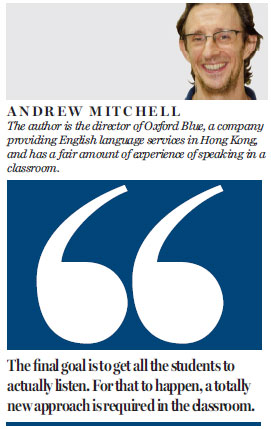Our city needs some 'sound' education of its teachers
Updated: 2016-01-13 08:13
By Andrew Mitchell(HK Edition)
|
|||||||
I am a terrible singer. But when I sing in a karaoke lounge, I always have a ready-made excuse: The microphone is no good. And although, of course, no one really buys this excuse, it does contain an element of truth. A standard microphone only gives a very approximate representation of your voice, flattening out the frequencies and distorting certain ranges, while high-quality microphones have a similar effect when used with low-quality speakers. And even a combination of high-quality microphones and speakers may not produce good results for all voice types in all situations.
So why, then, do so many teachers here allow their voices to be adulterated by unsophisticated classroom microphone systems? Why do they not, instead, give free rein in the classroom to their original voices, with all their timbre, range and flexibility? After all, if the voice can be said to be an actor's most valuable asset then the same can surely be said for a teacher.
No doubt users of classroom microphone systems will protest that they need to protect their voices - that if they had to teach without a microphone day in day out for weeks on end, by the end of term their voices would be completely worn out.
And yet, to an experienced public speaker, a classroom is an "intimate setting", where a microphone is certainly not required. So, in theory, there is absolutely no reason why teachers should not be able to do away with their microphones entirely. However in practice, before that can happen, they need to learn how to project their voices properly without hurting them.
Obviously this is easier said than done. But learning to use the diaphragm to avoid wearing out the voice box is a fundamental part of all voice training workshops. The problem for local teachers is that voice training is not included in standard teacher training courses, and is not covered in the teacher competencies framework for continuing professional development drawn up by the Education Bureau (EDB).
Clearly the EDB needs to revisit its competencies framework to address this fundamental need for voice training. It should also look at other ways it can help teachers in this regard.
Recently I watched a presentation by the sound consultant Julian Treasure in which he talked, among other things, about acoustics in traditional classrooms.
Of course, the benefits of this kind of acoustic treatment of classrooms would be felt even more keenly in Hong Kong, where many students are learning in a second language, and where classroom microphone systems can constitute an additional barrier to teacher-student communication. In fact one might even argue that improving the acoustics of local classrooms could help spark a mini-revolution in Hong Kong education. For by enabling teachers to dispense with classroom microphone systems, it would encourage them to communicate more directly with their students. This, in turn, would help them to incorporate learner-centered teaching strategies in the classroom, at the expense of the traditional "chalk and talk" approach facilitated by classroom microphone systems.
For this mini-revolution to occur, however, the EDB needs to look again at the issue of class size in local schools, since it is extremely difficult to manage learner-centered activities in classrooms of 30-plus students. Given the falling birth rate in the city at the moment, the authorities currently have a unique window of opportunity - a chance of affecting change without impacting heavily on the overall education budget.
It is very much to be hoped, therefore, that the EDB will have the courage and the foresight to revisit the fundamental issue of class size in Hong Kong. For while it is undoubtedly a matter of extreme importance to enable every student in every class to hear every word a teacher says, this is ultimately only the beginning. The final goal is to get all the students to actually listen. For that to happen, a totally new approach is required in the classroom.

(HK Edition 01/13/2016 page10)